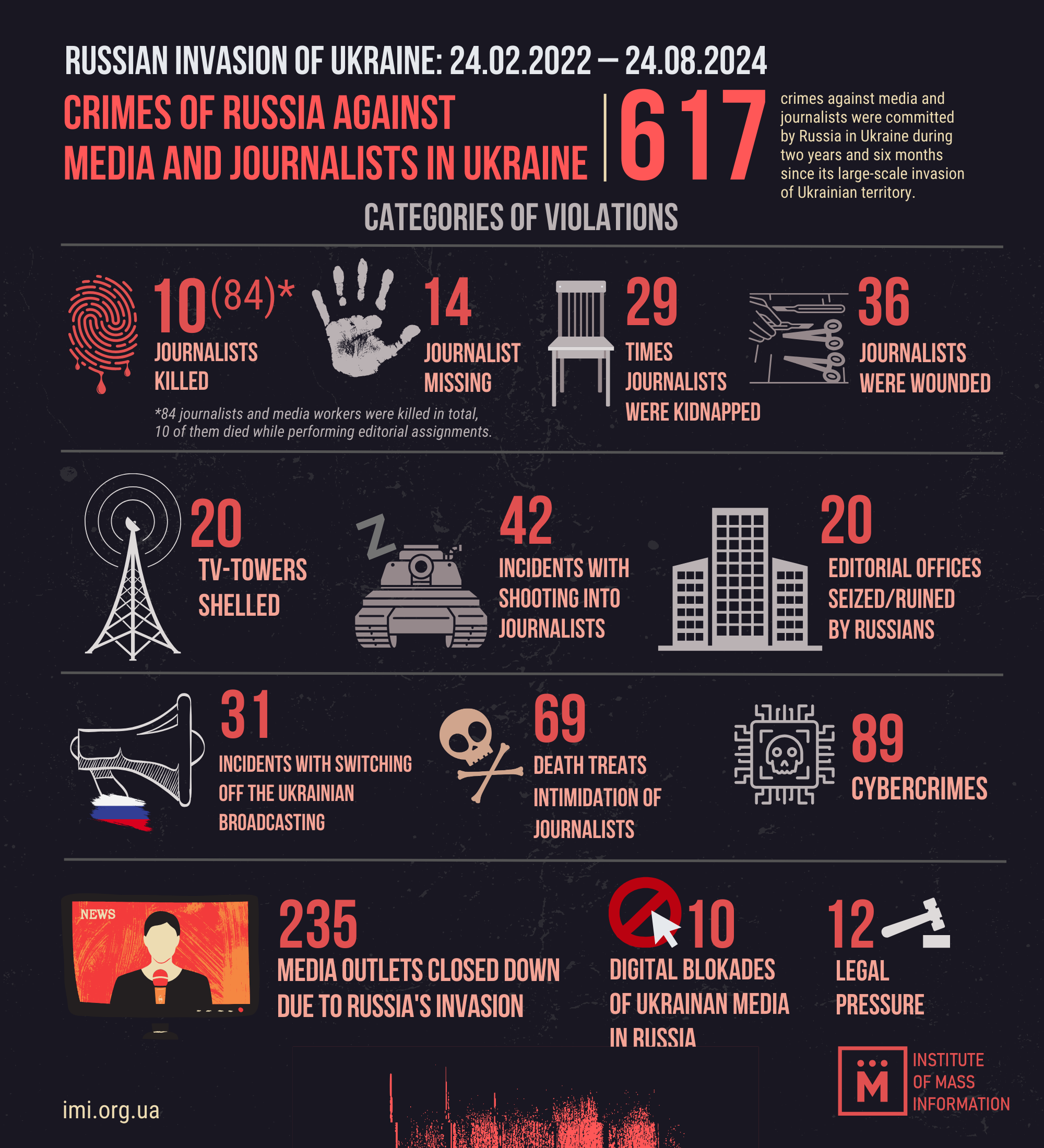In the two and a half years since the start of the full-scale invasion Russia committed 617 crimes against journalists and the media in Ukraine.
This is evidenced by the monthly monitoring of Russia’s crimes against journalists and the media by the Institute of Mass Information.
In July – August of 2024 the IMI recorded 10 crimes against the media and journalists committed by Russia: kidnapping journalists, legal pressure, cyber attacks, and disabling Ukrainian broadcasting.

Russia’s crimes against the media and journalists in Ukraine in the two and a half years of the full-scale war
Russia’s aggression resulted in the death of two media workers who were killed in combat while defending Ukraine:
- Volodymyr Chernyshov – a soldier and former cameraman for the Kropyvnytsky media outlet CBN. As of now, it has been reported that Volodymyr died from a mine injury during a shelling strike on Myrnohrad, Pokrovsk district, Donetsk oblast.
- Oleksiy Sapuha – a soldier and bird photographer from Mykolaiv, killed in action in Donetsk oblast on July 30.
According to IMI, as of August 24, 84 media workers were killed in Ukraine as a result , 10 of whom died while reporting.
It was reported in August that Yevheniy Ilchenko, who had been arrested by Russia in Melitopol two years earlier for running a Telegram channel where Ilchenko reported on the Russian occupation of the city, had endured torture and forced labour, including digging trenches for Russian troops. Before the Russian invasion of 2022 Ilchenko was a lawyer in Melitopol. On May 3, 2022, he secretly launched a Telegram channel called @Mitopol. He stated his intentions clearly with the very first message, which announced: “Analysis, events and facts.” At a great risk to himself, Ilchenko reported on the day-to-day life in occupied Melitopol.
Russian courts convicted three Ukrainian journalists in absentia:
- Fahrudin Sharafmal was sentenced to seven years in prison, convicted of “inciting hatred, rehabilitating Nazism and calls for extremism.”
- Oleksandr Prepodobny was sentenced to to eight years in prison in absentia under the law on “fakes” about the Russian army.
- Natalya Moseychuk was sentenced to five years in prison for “inciting hatred and enmity”.
Russia’s Federal Security Service (FSB) has also opened cases against the Ukrainian correspondents Olesya Borovyk (Kordon.Media) and Diana Butsko (Hromadske). The FSB accuses the journalists of illegally crossing the border and filming videos near Suzha. The journalists face up to five years in prison.
Ukrinform reported a hacker attack on their website. The website was receiving over 200 thousand requests per second, which resulted in some visitors having problems accessing the website. However, the attack was repelled. The news agency’s CEO Serhiy Cherevaty noted that they had grounds to believe that Russian hackers were likely involved in the attack.
The Russians also targeted the YouTube channel “How Not to Turn Braindead“, founded by the blogger Oksana Moroz. The channel received two copyright strikes from Russian users on videos reviewing the animated show “Masha and the Bear”. In these videos, psychologist Kateryna Holzberg analyzes the show and points out parallels with the Russians’ behavior in the war. Now the channel is under threat of takedown due to the strikes.
Russian hackers attacked the website Odesa Online, editing several posts and inserting illustrations with anti-Ukraine messages. The website’s team believes the Russian hacks have to do with Ukraine’s National Flag Day and Independence Day.
Read the full monitoring here.
The Institute of Mass Information (IMI) is a Ukrainian non-governmental media organization that has been operating since 1996. The IMI defends the rights of journalists, analyzes the media field and covers media-related events, fights propaganda and disinformation and has been providing media outlets with safety gear for trips to the combat zone since the start of the Russo–Ukrainian war in 2014.
The IMI carries out Ukraine’s only freedom of speech monitoring and keeps a list of high quality and sustainable online media outlets, documents Russia’s crimes against the media committed in the course of the war on Ukraine. The IMI has representatives in 20 oblasts of Ukraine and a network of “Mediabaza” hubs to provide journalists with continuous support. The IMI’s partners include Reporters Without Borders and Freedom House; the organization is a member of the International Organization for the Protection of Freedom of Expression (IFEX).
